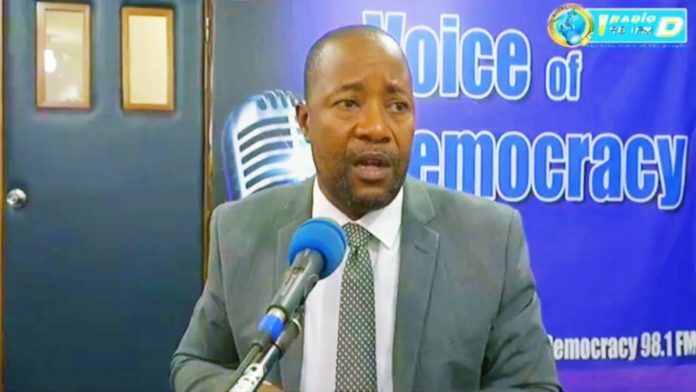By Foday Moriba Conteh
As advocacy for the repeal of Part V of the 1965 Criminal Libel Law intensifies the Minister of Information and Communications Mohamed Rahman Swaray has on Thursday 12th December, 2019 reaffirmed the SLPP Government’s commitment to repeal it. This disclosure was made during the Ministry of Information and Communications weekly press briefing at Youyi Building in Freetown.
The Information Minister stated that as they have been part of the repealing process he is very impressed that it has got cabinet approval and it will not be tabled to Parliament.
He said to show their commitment in repealing the law this is the first time they decided to dedicate an entire press briefing to discuss the repealing process. He assured the media that as a Government they are committed and the President is on track as they are working assiduously to make it happen.
He said they have engaged the Speaker of Parliament, the Minority Leader pointing out that Parliament has assured them that the bill will be tabled on Tuesday 17th December, 2019 and in that regard he called on all media practitioners to support the drive in the repealing process. The Minister expressed belief that they will give an executive representation as a Government and they will have an outcome that will they will be very impressive to the media.
President SLAJ, Ahmed Sahid Nasralla, disclosed that in September, 2016, SLAJ and the Ministry of Information and Communications, with support from the British High Commission and the Irish Embassy, held a National Symposium on the repeal of the said law, adding that the meeting brought together all stakeholders including Politicians, MPs, the SLP, the Human Rights Commission Sierra Leone, the BAR Association, Law Officers Department, CSOs etc. and that all these keys stakeholders agreed that the Criminal Law is a bad law and must be repealed.
Underscoring why the Criminal Law is bad he said it is the only Law in Sierra Leone which presumes you guilty until you are proven innocent by a court of law and with this law Truth is not a Strong Defence, or No Defence at all
He also added that because of this law business people are afraid to invest in the media which he said is one of the major reasons why the media in Sierra Leone is poor.
He said that this Law has in the past affected journalists, printers like the Atlantic Printers and the New Breed Newspaper Vs NPRC Government in mid 1990s and John Love Printers and Paul Kamara of Di People Newspaper Vs the late Justice Tolla Thompson and later Vs Late President Ahmed Tejan Kabba in the early 2000s. Both printing companies were shut down after the journalists were jailed, noting that the Criminal Libel also scares women from coming into the profession and from aspiring for top management positions within the media.
In relation to the safeguard of the privacy of personalities in the wake of the repeal, he said, the Independent Media Commission has powers to enforce provisions in the Codes of Practice. He added that there is also a Civil Defamation Law in place and with this law an offending journalist or citizen is required to pay a fine or compensation if found guilty further underscoring the self-regulation by SLAJ which is tailored by Code of Ethics and strengthening of the SLAJ Disciplinary Committee.
Chairman of the Independent Media Commission, George Khoryama, said IMC is the body charged with the statutory authority to monitor, regulate and promote professional ethics in the media in Sierra Leone, adding that the Commission has embarked on a nationwide Meet the Press Tour to prepare the minds and the hearts of media owners, stakeholders, media managers and frontline journalists on the implications of the repeal of the Criminal Libel Law.
He noted that the media in Sierra Leone, which is made up of 200 registered newspapers, 165 registered community, commercial and religious radio broadcasters, a public broadcaster and 29 Televisions stations and DTH services is at the crossroads with the pending repeal of Part V of the Criminal Libel Law which criminalizes libel where not even truth is sufficient as a defense.
“At this momentous threshold in which the media is about to perceive a new found freedom, there are many who still entertain fear that the repeal of the Criminal Libel Law will unleash a spate of unprofessional journalism that will give the media a field day to abuse the rights of citizens in their publications and broadcast. There are others however who feel that this moment should be embraced in all its entirety as it puts us in symphony with the rest of world in international best practices that promote professionalism in the media,” he highlighted.
He maintained that during the national tour, the Commission embarked on compliance monitoring from legal, managerial, financial and technical parameters. It against this backdrop that the Commission urged for basic compliance with the following
- Payment of correct wages to media practiontiners above the minimum wage
- Payment of correct taxes to NRA
- Payment of journalists and media practitioners etc.
He concluded by saying as report generally states a lot of growth has taken pace across the media landscape in Sierra Leone with different stakeholders playing their part in the improvement of the media. The IMC head stated also that there are serious problems around compliance in the payment of the correct salaries for journalists, NASSIT payment by managers, lack of coordination in governance structures in the formation of Boards right across the country.




